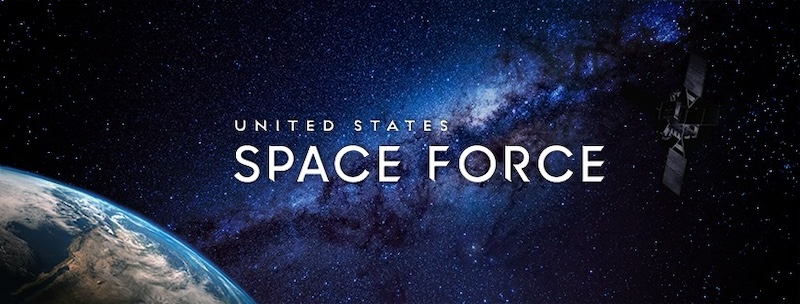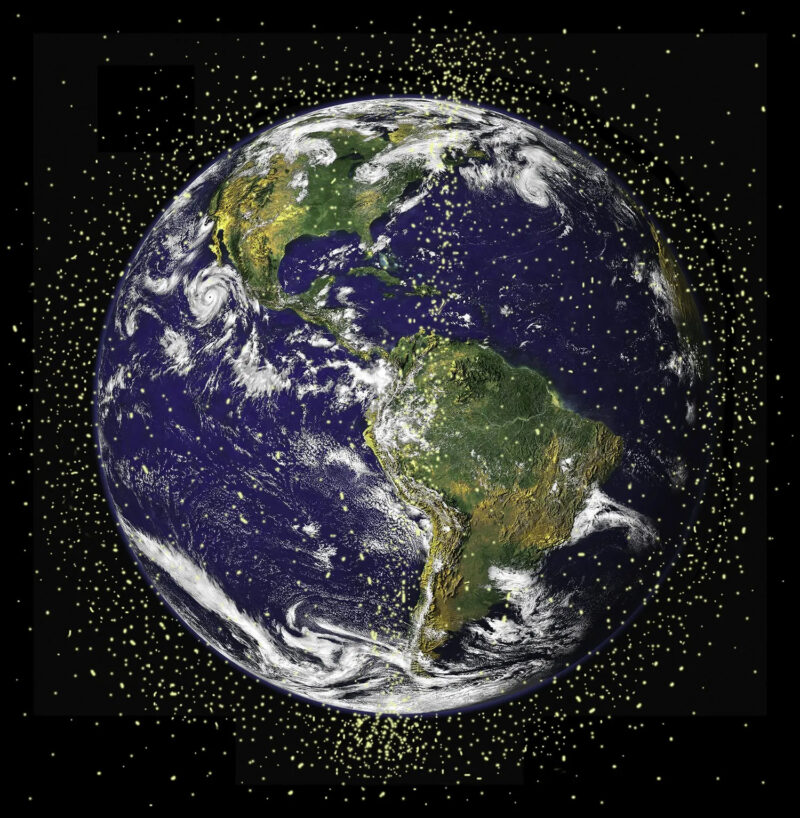
Have you heard of STARCOM? It’s also known as the Space Training and Readiness Command, headquartered at Peterson Space Force Base, Colorado. STARCOM works in education and training, and in doctrine, for the U.S. Space Force. And on November 16, 2023, STARCOM released a publication titled SDP 3-100: Space Domain Awareness.
Space domain awareness is routine stuff. It’s the detection, tracking and cataloging of objects orbiting Earth (active or inactive and foreign or domestic satellites, for example).
But there’s one part of the new document that has caught people’s attention. It has become part of the continued discussion of what the U.S. government calls Unidentified Anomalous Phenomena, or UAP … known to most of us as UFOs.
In short, the Space Force wants to track “abnormal observables and patterns of life” with “unknown origins.”
Sounds intriguing, but what does it mean?
The 2024 lunar calendars are here! Best Christmas gifts in the universe! Check ’em out here.
What is space domain awareness?
Brett Tingley wrote about the new STARCOM publication for Space.com on November 22, 2023. As Tingley noted:
Most of the document describes the need to maintain a safe environment by monitoring and tracking such objects as pieces of space debris, the ever-growing number of commercial satellites, spacecraft operated by adversaries, and ‘the hazards posed by the space environment and natural debris’ such as meteoroids or solar flares.
The Space Domain Awareness document itself said:
Operating safely in the space domain requires the ability to detect, track, characterize, discriminate between and maintain custody of increasingly smaller spacecraft and debris with increased accuracy. It requires the ability to detect, track, characterize, discriminate, and maintain custody of objects that are dimmer, more distant or otherwise difficult to observe despite the increased proliferation of objects that are nearer and brighter.
Tracking ‘abnormal observables with unknown origins’
The document continued:
It requires the ability to rapidly identify and respond to threats and hazards, including objects that exhibit abnormal observables and patterns of life and cannot be correlated to any owner or point of origin.
So what are “objects that exhibit abnormal observables and patterns of life?” Usually rockets, as Tingley pointed out:
Most of the time, these are objects launched by other nations. The STARCOM document points out that it is ‘imperative for the safety of space operations that the United States not only knows where objects and spacecraft are at any given time, but also how they got there, who owns them, their potential capabilities and their operator’s intent.’

Space Force connection to UAP?
But could some objects be UAP? That’s what the UFO-interested community wants to know. Perhaps you’ve followed the talk in the U.S. Congress in recent years on the subject of UAP? In July 2022, the U.S. Department of Defense created an All-domain Anomaly Resolution Office, whose job is to investigate:
… Unidentified Flying Objects (UFOs) and other phenomena in the air, sea, and/or space and/or on land: sometimes referred to as ‘Unidentified Aerial Phenomena’ or ‘Unidentified Anomalous Phenomena’ (UAP).
This office’s annual report – released in October 2023 – mentions near-Earth space as one of the domains regarding UAP reports. The Glossary of Terms said:
Unidentified Anomalous Phenomenon (UAP): Sources of anomalous detections in one or more domain (i.e., airborne, seaborne, spaceborne and/or transmedium) that are not yet attributable to known actors and that demonstrate behaviors that are not readily understood by sensors or observers. ‘Anomalous detections’ include but are not limited to phenomena that demonstrate apparent capabilities or material that exceed known performance envelopes. A UAP may consist of one or more unidentified anomalous objects and may persist over an extended period of time.
More specifically, it listed UAP in space as:
Spaceborne UAP: Sources of anomalous detections above the Kármán Line [The proposed boundary between Earth’s atmosphere and outer space, located some 6 miles or 10 kilometers above Earth’s mean sea level].
NDAA Science Plan and UAP
As in the previous couple years, the National Defense Authorization Act (NDAA) for 2023 contained UAP-related mandates as well. The Science Plan portion stated:
SCIENCE PLAN – The Director of the Office, on behalf of the Secretary and the Director of National Intelligence, shall supervise the development and execution of a science plan to develop and test, as practicable, scientific theories to:
(1) account for characteristics and performance of unidentified aerospace-undersea phenomena that exceed the known state of the art in science or technology, including in the areas of propulsion, aerodynamic control, signatures, structures, materials, sensors, countermeasures, weapons, electronics and power generation; and
(2) provide the foundation for potential future investments to replicate or otherwise better understand any such advanced characteristics and performance.
So, it sounds like the Space Force could be tracking some objects – among all the “regular” ones – that the Department of Defense might consider to be UAP (and NASA has similar descriptions for UAP).
But, for now at least, most of the information related to any possible tracking of UAP is classified. So we probably won’t hear much about whatever they might find … if indeed there is anything to be found.
Bottom line: The U.S. Space Force is now charged with tracking objects near Earth that exhibit ‘abnormal observables’ and are of ‘unknown origin.’
Source: STARCOM Releases Space Domain Awareness Doctrine Publication
Read more: Launches: U.S. Space Force takes command
Read more: Will the proposed UAP Disclosure Act reveal UFO secrets?
The post Space Force to track ‘abnormal objects of unknown origin’ first appeared on EarthSky.
from EarthSky https://ift.tt/qrRnNFT

Have you heard of STARCOM? It’s also known as the Space Training and Readiness Command, headquartered at Peterson Space Force Base, Colorado. STARCOM works in education and training, and in doctrine, for the U.S. Space Force. And on November 16, 2023, STARCOM released a publication titled SDP 3-100: Space Domain Awareness.
Space domain awareness is routine stuff. It’s the detection, tracking and cataloging of objects orbiting Earth (active or inactive and foreign or domestic satellites, for example).
But there’s one part of the new document that has caught people’s attention. It has become part of the continued discussion of what the U.S. government calls Unidentified Anomalous Phenomena, or UAP … known to most of us as UFOs.
In short, the Space Force wants to track “abnormal observables and patterns of life” with “unknown origins.”
Sounds intriguing, but what does it mean?
The 2024 lunar calendars are here! Best Christmas gifts in the universe! Check ’em out here.
What is space domain awareness?
Brett Tingley wrote about the new STARCOM publication for Space.com on November 22, 2023. As Tingley noted:
Most of the document describes the need to maintain a safe environment by monitoring and tracking such objects as pieces of space debris, the ever-growing number of commercial satellites, spacecraft operated by adversaries, and ‘the hazards posed by the space environment and natural debris’ such as meteoroids or solar flares.
The Space Domain Awareness document itself said:
Operating safely in the space domain requires the ability to detect, track, characterize, discriminate between and maintain custody of increasingly smaller spacecraft and debris with increased accuracy. It requires the ability to detect, track, characterize, discriminate, and maintain custody of objects that are dimmer, more distant or otherwise difficult to observe despite the increased proliferation of objects that are nearer and brighter.
Tracking ‘abnormal observables with unknown origins’
The document continued:
It requires the ability to rapidly identify and respond to threats and hazards, including objects that exhibit abnormal observables and patterns of life and cannot be correlated to any owner or point of origin.
So what are “objects that exhibit abnormal observables and patterns of life?” Usually rockets, as Tingley pointed out:
Most of the time, these are objects launched by other nations. The STARCOM document points out that it is ‘imperative for the safety of space operations that the United States not only knows where objects and spacecraft are at any given time, but also how they got there, who owns them, their potential capabilities and their operator’s intent.’

Space Force connection to UAP?
But could some objects be UAP? That’s what the UFO-interested community wants to know. Perhaps you’ve followed the talk in the U.S. Congress in recent years on the subject of UAP? In July 2022, the U.S. Department of Defense created an All-domain Anomaly Resolution Office, whose job is to investigate:
… Unidentified Flying Objects (UFOs) and other phenomena in the air, sea, and/or space and/or on land: sometimes referred to as ‘Unidentified Aerial Phenomena’ or ‘Unidentified Anomalous Phenomena’ (UAP).
This office’s annual report – released in October 2023 – mentions near-Earth space as one of the domains regarding UAP reports. The Glossary of Terms said:
Unidentified Anomalous Phenomenon (UAP): Sources of anomalous detections in one or more domain (i.e., airborne, seaborne, spaceborne and/or transmedium) that are not yet attributable to known actors and that demonstrate behaviors that are not readily understood by sensors or observers. ‘Anomalous detections’ include but are not limited to phenomena that demonstrate apparent capabilities or material that exceed known performance envelopes. A UAP may consist of one or more unidentified anomalous objects and may persist over an extended period of time.
More specifically, it listed UAP in space as:
Spaceborne UAP: Sources of anomalous detections above the Kármán Line [The proposed boundary between Earth’s atmosphere and outer space, located some 6 miles or 10 kilometers above Earth’s mean sea level].
NDAA Science Plan and UAP
As in the previous couple years, the National Defense Authorization Act (NDAA) for 2023 contained UAP-related mandates as well. The Science Plan portion stated:
SCIENCE PLAN – The Director of the Office, on behalf of the Secretary and the Director of National Intelligence, shall supervise the development and execution of a science plan to develop and test, as practicable, scientific theories to:
(1) account for characteristics and performance of unidentified aerospace-undersea phenomena that exceed the known state of the art in science or technology, including in the areas of propulsion, aerodynamic control, signatures, structures, materials, sensors, countermeasures, weapons, electronics and power generation; and
(2) provide the foundation for potential future investments to replicate or otherwise better understand any such advanced characteristics and performance.
So, it sounds like the Space Force could be tracking some objects – among all the “regular” ones – that the Department of Defense might consider to be UAP (and NASA has similar descriptions for UAP).
But, for now at least, most of the information related to any possible tracking of UAP is classified. So we probably won’t hear much about whatever they might find … if indeed there is anything to be found.
Bottom line: The U.S. Space Force is now charged with tracking objects near Earth that exhibit ‘abnormal observables’ and are of ‘unknown origin.’
Source: STARCOM Releases Space Domain Awareness Doctrine Publication
Read more: Launches: U.S. Space Force takes command
Read more: Will the proposed UAP Disclosure Act reveal UFO secrets?
The post Space Force to track ‘abnormal objects of unknown origin’ first appeared on EarthSky.
from EarthSky https://ift.tt/qrRnNFT

Aucun commentaire:
Enregistrer un commentaire